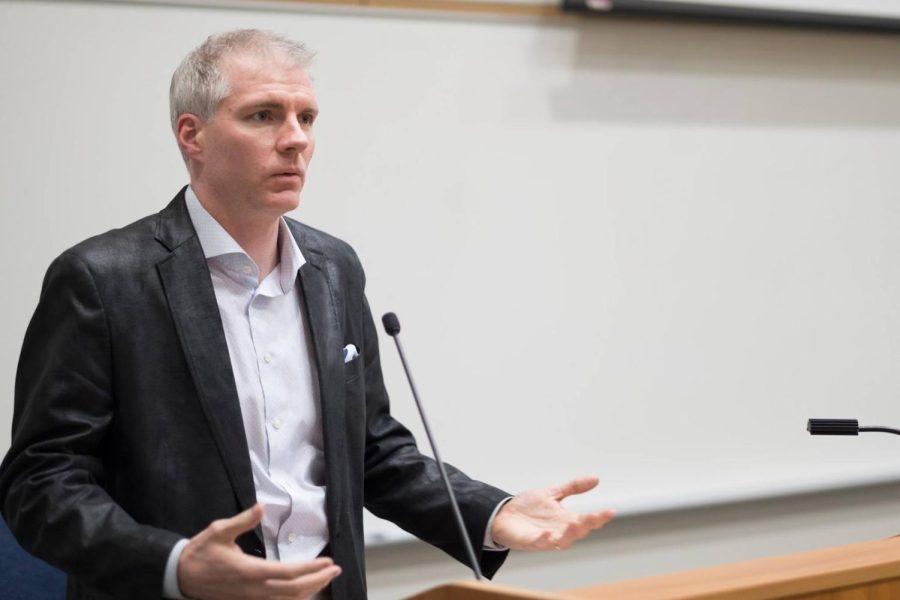Tackling incarceration in America
Founder and CEO of EDWINS Leadership and Restaurant Institute speaks following the screening of 88 Cents on Thursday, March 8, 2018.
The audience sat in silence, with expressions of disbelief growing across their faces.
When the lights in room 340 of Franklin Hall grew bright again following the screening of the short film “88 Cents,” it felt as though the entire room took a large exhale.
Kent State alumnus Tyler Pina’s, breathtaking film depicted life after incarceration in America could only be described as breathtaking. In 38 minutes, using only the sounds and voices of background characters, Pina effortlessly depicted the life of an ex-convict looking to rebuild his life in San Francisco following five years behind bars.
Part of a larger three-part event hosted by the College of Communication and Information, “88 Cents” silently screamed the importance of rebuilding the incarceration system in America.
Prior to the screening, students, alumni and community members toured the graphic novel showcase located in Taylor Hall, “The Real Cost of Prisons,” featuring work from three award-winning New York City illustrators as well as original illustrations from those currently incarcerated.
According to the Department of Justice, approximately 641,000 prisoners will leave prisons all over the United States this year and more than half of these people will return to prison within five years of their release.
Visual communication and design alumnus David Wilson said, as a white male, the pieces in the exhibit gave him perspective.
“Every year I become more aware of my surroundings and the privileges I do have,” Wilson said. “This exhibit might not be ‘your type’ of art, but it has the weight of content that other portfolio type shows might not have.”
Senior visual communication design major Lacy Talley added she found the exhibit so exciting for the truths it told about incarceration in America.
“This narrative is not shown with people who are not of color,” Talley said. “This is real. It happens.”
When asked about her favorite piece in the showcase, Talley gleefully moved to the other side of the room where the illustration entitled “Free At Last” hung.
The somewhat satirical title layed way for an illustration of a man who continuously finds barbed-wire fences upon leaving prison, a story Talley believes is a true, everyday event in America.
Following the screening of “88 Cents” and a brief question and answer session with director Tyler Pina and lead actor Matthew Weitz, Brandon Chrostowski spoke.
Chrostowski is the founder and CEO of Edwins Leadership and Restaurant Institute, which trains and employs former prisoners shared his story, now featured in the Oscar-nominated film, “Knife Skills.”
Chrostowski opened his speech by telling the audience his story: an 18-year-old kid from Detroit with a lot of unchanneled energy who had a run-in with the law and received a break from a judge who believed in second chances.
After receiving extensive coaching and inspiration from a mentor in the culinary business, Chrostowski found his passion. After attending The Culinary Institute of America, he traveled around Europe and the United States learning the intricate tools of the trade.
In 2007, he chose Cleveland as the location for EDWINS because of its high high school dropout rate associated with its high incarceration and poverty rate.
“Edwins is a fair and equal second chance,” Chrostowski said. “A human being on their own can do incredible things, but a human being with people behind you is absolutely ludicrous.”
Since it opened on Nov. 1, 2013, Edwins has seen 250 graduates pass through its doors. Ninety-five percent of graduates obtain almost immediate long-term employment at high-end restaurants across the country. Only one percent of Edwins graduates have been re-incarcerated.
In 2016 Edwins opened the Second Chance Life Skills Center, a 20,000 square foot campus for living, working and recreational activities.
Chrostowski said it is hard for people in his program to progress if they do not have a safe place for them and their family to live.
Edwins recently purchased a secondary building near its Shaker Heights location for a butcher shop and bakery. Also, its in the process of creating a second Edwins Leadership and Restaurant Institute in Medina, focused on students coming out of drug and alcohol rehabilitation programs.
“Hard work — not gender, race or status — rules in the Kitchen,” Chrostowski said.
Madeline Scalzi is the student life and education reporter. Contact her at [email protected].



